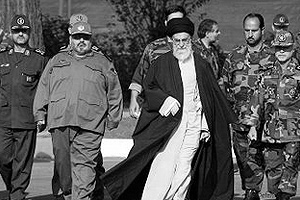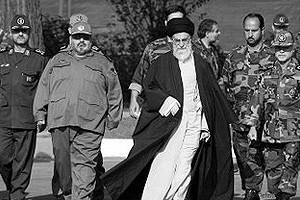
Mohammad Amin | Nov 05, 2015
In a post-nuclear-deal setting, the Iranian consumer market, characterized by a young and innovative population whose consumption habits align with western models, seems hard to resist for western companies. But, it would be detrimental if in striking business deals with Iran, these companies set aside all caution and vigilance. In most cases, they would be dealing with the worst elements of the regime.
Consider one of the more recent examples.
It is usually the Iranian capital Tehran that hosts high-level foreign delegates. Last month, however, it was the city of Mashhad that played host to a sizeable delegation representing French business interests. Why?
The city is home to the shrine of revered Shiite Imam Reza and a major holy destination for Shiites everywhere. The custodian of the shrine is a huge commercial enterprise called the Astan-e Qods-e Razavi, which is one of the most profitable components of regime Supreme Leader Ali Khamenei’s vast commercial empire. Astan holds extensive agricultural interests. And last month, French and Iranian agriculture ministers Stephane Le Foll and Mahmoud Hojjati signed five trade deals in the field of agriculture.
The French deal was part of a whirlwind of foreign interest in Iran’s untapped economy. But what is worrying about this trend is that the Iranian economy is dominated by Khamenei’s foundations (like Astan-e Qods) and the Islamic Revolutionary Guard Corps (IRGC), which are involved in the export of terrorism and instability abroad. According to some estimates, Khamenei and IRGC-run foundations control almost two thirds of the economy.
Many companies doing business in Iran (including investments, imports and exports) find themselves dealing with holding groups that have two identifies: One is the professional and presentable side that signs the deal. The other is the true and consistent side that channels the profits toward domestic suppression, shoring up the Assad dictatorship in Syria, helping the Lebanese Hezbollah and supporting the operations of the Qods Force in Iraq and Yemen. Paradoxically, all these things threaten western business interests in other areas.
There are other reasons why western companies should be a lot more careful before jumping in blindly.
First, Iran has a rapidly decaying infrastructure. In July, one of President Hassan Rouhani’s advisors said the infrastructure deficit has “reached a dangerous threshold. In many areas, we are at full capacity.”
Second, there are extensive and deep-rooted legal obstacles, which have huge embedded risks and lead to a lack of transparency in the majority of deals.
Consider the following examples of doing business in Iran, showing all roads lead to foundations run by Khamenei and the IRGC.
Exhibit 1: Perhaps the hotel chain Accor, whose representatives signed a deal in Tehran on September 15 with the Iranian company Aria Ziggurat to manage Novotel and Ibis, did not know that Arya is part of a group of companies owned by the IRGC.
The company is fully owned by a tourism investment company called Iran Cultural Heritage and Tourism Investment Group Co. (SEMGA), which was set up in 2009 with a meager capital of 20 million dollars. Among SEGMA investors are former members of Mahmoud Ahmadinejad’s inner circle, including his chief of staff Rahim Mashai.
After the IRGC took control of Khomeini airport in southern Tehran, it handed the company roughly 31,000 square meters of land, practically for free, to jump-start its operations.
The Tehran Securities Exchange Technology Management website lists SEMGA’s investors, all of whom belong to the IRGC or its paramilitary unit the Bassij. They include: the Caspian Talay-e Daran Tejarat, Laleh Hotel in Assaluyeh, Tarh-e Sazeh Tanyin, Saba Saman, Askarieh Credit Union, and Mola al-Movaheddin Credit Institution.
Exhibit 2: The KBC Company, which has exclusive rights to products imported from the French company Sanofi Pasteur, also has import agreements with the German company Sandoz Hexal, as well as cooperation agreements with the British GSK and American Jansen companies.
KBC belongs to the Barakat Pharmaceutical holding company, which is one of the most profitable entities in Khamenei’s Setad Ejraee.
Exhibit 3: Atipharmed Company, which also belongs to Khamenei’s Setad group, was created in 2011 as a joint venture with the Swiss company Stragen to produce hormone pills.
Exhibit 4: The Sobhan drug company, also belonging to Khamenei, has signed agreements with Italy’s ABC Pharmaceutical.
The danger of doing business with such mafia-like foundations and organizations is that they can set the rules and at the same time violate them with impunity.
For example, Carrefour has set up a number of branches in Iran under the brand Hyperstar-Iran, attracting some Iranian consumers. However, IRGC-affiliated media outlets routinely brand Hyperstar as an Israeli tool. In fact, this is a ploy to confiscate part of the company’s now lucrative Iranian assets.
Iranian economy and politics are highly unstable, largely due to the Iranian people’s hatred toward the regime. Last month, a boycott campaign targeted IRGC-affiliated car manufacturers, which went viral in Iran’s social media and seriously threatened sales. According to the State-run ILNA news agency on September 21, 2015, a number of parliamentary deputies even warned that such a boycott could spell an end to the auto industry.
Perhaps doing business with Iran may not be as lucrative as it would seem at first glance.
Mr. Amin is a senior research fellow for the Paris-based Fondation d’Etudes pour le Moyen-Orient, FEMO, (Foundation for the Study of the Middle East).
Source: http://townhall.com/columnists/mohammadamin/2015/11/05/buyers-beware-the-islamic-revolutionary-guard-corps-is-your-business-partner-n2076372


